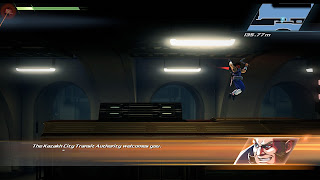Strider is a word used here for ... Like literally ninja. You're a "strider" from a "strider" school which teaches you to strider people to death. It's weird. They also call you "Strider" like it's a name but you are also a strider from that strider school, and they previously sent other striders to bestride the stride-able but they failed in their striding leaving all possible stridering to you.
Or something? In Ninja Gaiden do they just call the main character 'ninja?'
I had actually played Strider on the Genesis slash Mega Drive back when I was a young'un, but I don't have any strong memories of it. Reading wikipedia on the history of the release, it sounds like it was considered very highly as games go and not a metroidvania at all. Strider, here, is a Metroidvania and thereby covered vaguely under the toward the verge sub-banner of games I've played.
I'm going to be honest in that as a genre goes or has gone for me this year, this has not been what I would call a pleasant set of games. Generally speaking what you end up with are a lot of games with dull hallways, mediocre enemy placement, boring gameplay. No sense of exploration, of 'opening up' the game world or progression.
Strider is both the best and worst of the games I played in this regard. I didn't write many reviews, since there are more than a few games I feel like I might go back to in the doldrums between the two great sales, when I'm not trying to grind out many a card. Strider is a mix of a lot of elements that really make me wonder how much better it would have been if it wasn't crippled by being lashed to metroidvania elements.
It is also apparently inspired by Shadow Complex, so man, did that ever make me not want to pick up Shadow Complex.

The coolest thing about this game is that the Strider's scarf changes color when you change plasma options. You won't notice this early on, since you don't get a plasma change for quite a while, but you can actually change it on the fly and it slowly flows out. A lot of the visuals pick up on this sort of subtle element while the rest of the game hesitantly sits down before drooling on itself.
















